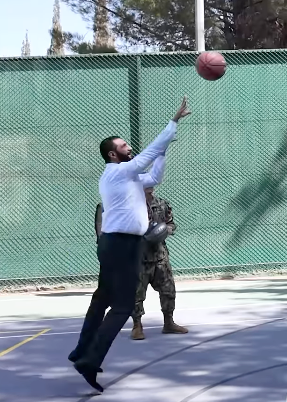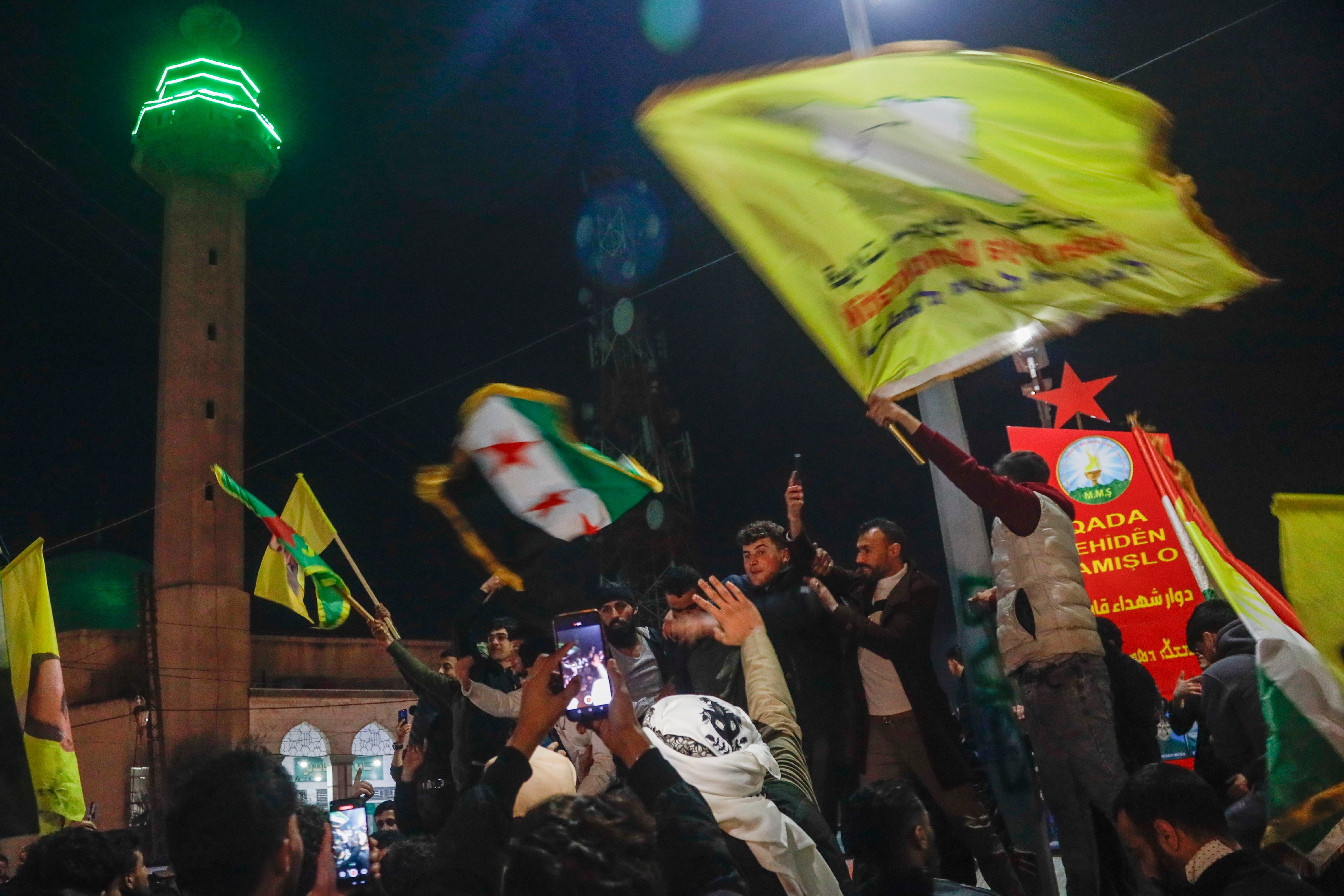Nothing says you’re off the State Department’s terrorism list like a viral video of you shooting hoops with a gaggle of American military commanders.
That is just the latest bizarre episode in the extraordinary narrative arc of Syrian President Ahmed al-Sharaa, who went from being an ex-al-Qaeda militant with a $10 million bounty on his head to being dubbed by Donald Trump, the Middle East’s new “young, attractive tough guy”.
After his success on the unnamed basketball court, President al-Sharaa was in Washington DC today to meet his newest and most powerful fan. He also became the first Syrian president to visit the White House since the country gained independence in 1946.
The agenda of today’s closed doors meetings is by no means easy, covering some of the most fraught fault lines in the simmering region.
Sharaa was the former head of the Islamist militant group Hay’at Tahrir al-Sham which, although once aligned with al-Qaeda, severed ties in 2017. He stormed to power in December last year, leading rebel forces that toppled Syrian dictator Bashar al-Assad.
He has since become the interim president of Syria, a country struggling to rebuild and heal its deep, internationally-exploited sectarian rifts after a 13-year civil war and more than half a century of brutal Assad family rule.

President al-Sharaa has seen some significant wins: in the last week alone he has been removed from the US, UK and United Nations sanctions blacklists.
No doubt he will want reassurances during his Washington visit today about the permanent and unconditional repeal of remaining sanctions that, although partially suspended, continue to have a chilling effect on badly-needed international investment in his war-ravaged country.
Top of the agenda for Trump will be his desire for some kind of security pact between Syria, his newest regional ally, and Israel, his closest.
President al-Sharaa will, I imagine, be more interested in guarantees from the American president that he can rein in neighbouring Israel, which has been stirring the pot by repeatedly bombing Syria since Assad was ousted and directly intervening in sectarian clashes in the south.
Israel, whose troops have invaded and even reportedly built military bases on Syrian territory, claims it is trying to protect Syria’s Druze population, an ethno-religious minority with roots in Shia Islam whose adherents live in Syria, Lebanon and, crucially, Israel.
And so citing pressure from its own Druze population, Israel has taken a violent stand, raining missiles down on Syrian government forces in the south and central Damascus, pounding the country’s defence ministry and presidential palace.
Al-Sharaa will want an end to Israel’s bombings and incursions.

Trump, for his part, will want to push ahead with a possible security pact between Syria and Israel - likely through the framework of the Abraham Accords, the diplomatic trade and normalisation deals between Israel and several countries, including the UAE.
Alongside this are negotiations on Syria joining a US-led coalition to fight the so-called Islamic State (Isis), which possibly might be announced during the visit.
Just hours before the landmark talks, word emerged of two separate Isis plots to assassinate President al-Sharaa that had been foiled over the past few months, Syrian security official sources told Reuters.
Over the weekend, the Syrian interior ministry also launched a nationwide campaign targeting Isis cells across the country, according to government media.
This also comes on heels of a Reuters report that the US is planning to establish a military presence at a Damascus airbase firmly within the president’s administration’s territory.
All of this would mark a significant shift for Syria, where the US’s closest allies, and partners in the anti-Isis war, have so far been the Kurdish-led Syrian Democratic Forces (SDF).
Based in the autonomous Kurdish-dominated region in the northeast of Syria, the SDF has fought side by side with American troops in the fierce battles that destroyed Isis’s “caliphate”.

SDF commanders have repeatedly told me they remain wary of the Damascus administration. There are myriad reasons: al-Sharaa’s former al-Qaeda ties, the integration of foreign Islamist fighters into the Syrian army, concerns about Kurdish autonomy, and al-Sharaa’s forces’ Turkish support and alliance with the Turkish-backed Syrian armed groups, which have been engaged in their own war against Kurdish positions since 2019.
Last month, the Syrian government and Kurdish-led forces agreed in principle to a plan to merge the SDF into the national army as a first step.
But there is still a lot of distrust and still unresolved issues, including who will run the Isis detention facilities currently managed by the SDF and the northeast Syrian administration .
A new firmed-up alliance between President al-Sharaa and Trump will pile pressure on the SDF to comply.
That said with the depths of the problems ravaging the region, with an agenda this complex, however productive, the meeting won’t be a slam-dunk. But it is a significant start.
Jeffries challenged about Schumer’s leadership after shutdown vote: Live
Louisiana prison guards cut a Rastafari inmate's dreadlocks. Supreme Court will decide if he can sue
MAGA media chief warns that Trump looks ‘weak and rudderless’ and has lost ‘vision’
Syrian president al-Sharaa plays basketball with US officials ahead of Trump summit
Tehran may be evacuated as Iran faces worst drought in decades
Iran says IAEA inspectors visited nuclear sites after watchdog urges more cooperation







